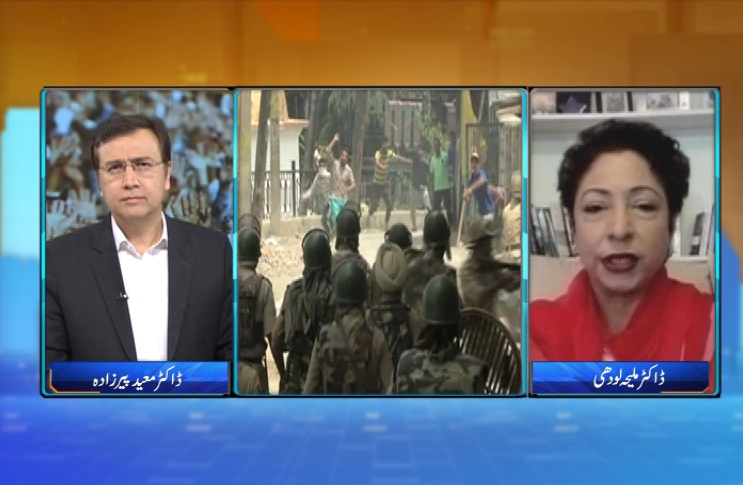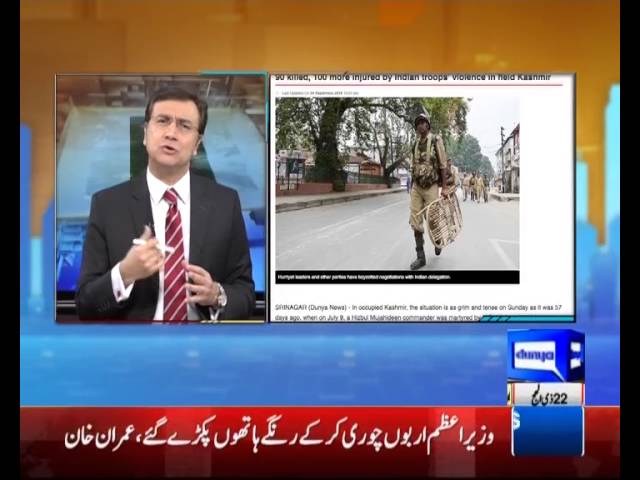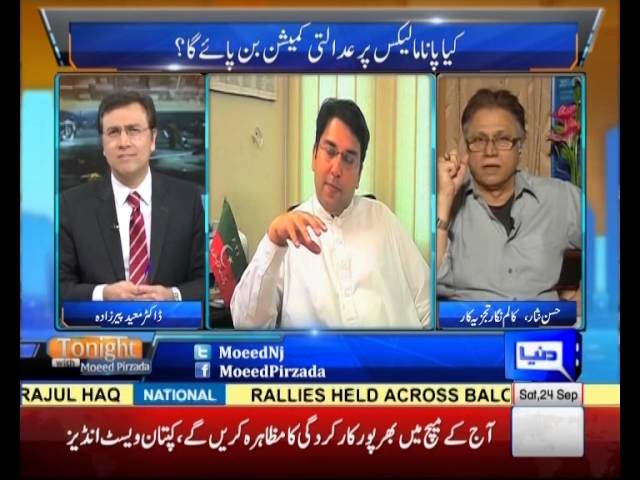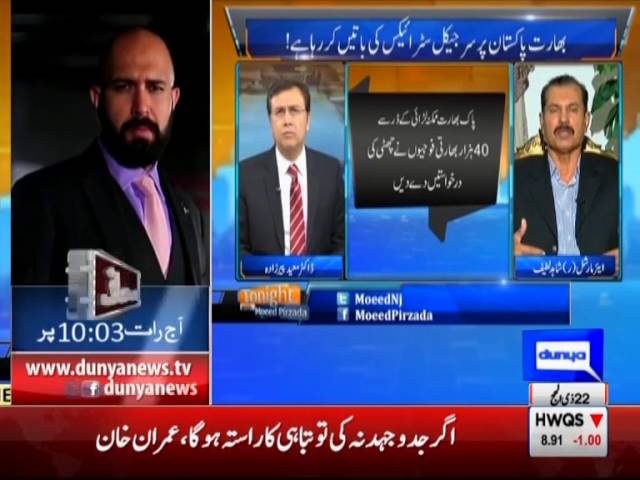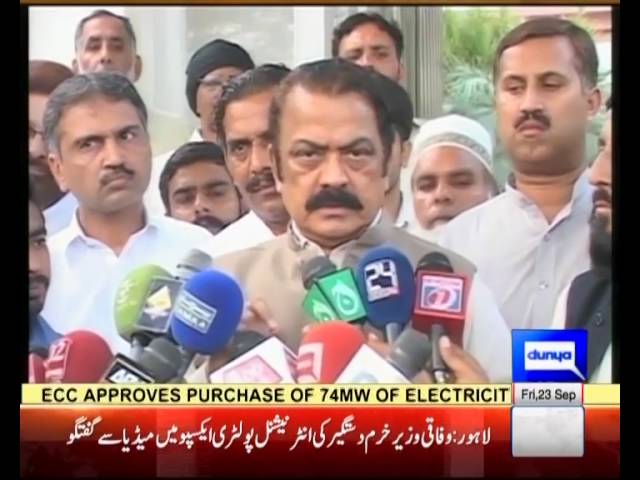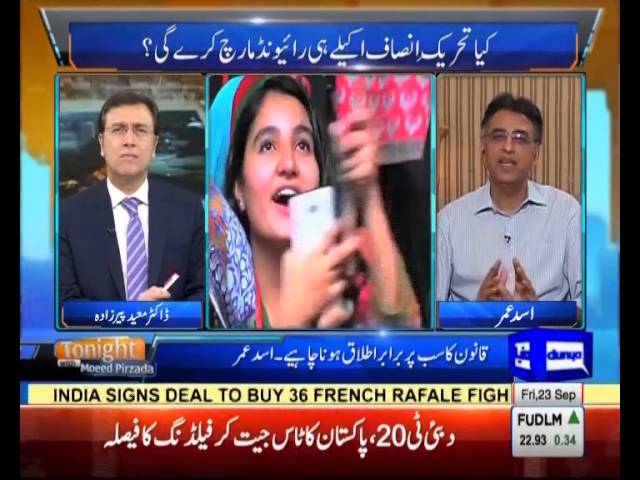Lieutenant General (r) Amjad Shuaib, prominent defense analyst joined Doctor Moeed Pirzada to offer his analysis on the on-going hostility between India and Pakistan, originated after the false flag ‘Uri’ base camp attack.
In light of the recent water blockade by the government of China on Tibetan fronts after the Indian government threatened to violate the Sindh-taas water treaty, the general said that India and China have no active water treaty, so it is under China’s liberty to shut down its waters on India whenever it deems fit.
Commenting on the Indian outcry of being a victim of terrorism, he said that Pakistan has suffered from this plague continuously for the past decade. After the 2008 attack, this Uri attack is the second (as denoted by the Indian authorities) terrorist attack to have happened in India. In comparison to Pakistan, India has not suffered to external terrorism at all. India has been victim to internally instigated terrorism, like the Tamil Tigers and other rebel movements.
He also revealed that regarding the much criticized move of the Prime Minister Nawaz Sharif at the UNGA of not discussing the Indian saboteur Commander Kulbushan Yadav, the Prime Minister was given a complete dossier of the details of the saboteur before the speech, but it was rejected on technical grounds.
Tonight with Moeed Pirzada: Indian threats, China had the ace of spades all along !!
Tonight with Moeed Pirzada: Raiwind March & PTI Position on Panama Leaks !!!
Speaker Ayaz Sadiq did not allow the opposition to argue on Panama Leaks. Contrary to the expectations, people participated in Imran Khann’s jalsa. Imran Khan gains popularity over a night. Chairmen of all institutions claim that they cannot do anything in regards to Panama Leaks. Chairmen FIA claimed, there exists no law to investigate Panama Leaks. There is lawlessness in the country. Government is playing foul with Ayaz Sadiq. Chairmen of all institutions were shivering in the Public Accounts Committee.
Tonight with Moeed Pirzada: Surgical Strike: Another India’s False Flag Operation
India’s false flag operation claimed on 29th by Indian DGMO was without any details, except that it was done in seven sectors of Azad Kashmir. Later Indian media revealed the details of surgical strike in which choppers were used and were conducted 3 to 5 KM inside Pakistani territory.
Whereas on the other side, DG-ISPR today took the local and international media to LoC. He briefed the media, saying that Pakistan has never restricted media or UN observers, while India has never let media or UN missions to go beyond Delhi.
Dr. Pirzada further said that earlier in a private meeting with foreign diplomats and international media correspondence, they asked him not to replay on DG-ISPR’s briefing. Therefore, Dr. Pirzda interacted with various locals of LoC area who witnesses the daily cross boarder firing, but there was not any such incidence which Indians claim.
Dr. Pirzada said that Indians have already praised Modi by declaring him great leader than Indra Ghandhi. He is moving toward the wrong direction.
Tonight with Moeed Pirzada: Sunjay Kumar Perspective on LOC surgical Strikes !!!
Dr Moeed Pirzada is joined by Sanjay Kumar, an Indian journalist who writes regularly for Pakistani English newspapers Dawn and Express Tribune. Sanjay kumar is strong critique of his country’s Modi regime. In recent piece in Dawn News “Modi has become a prisoner of his own image” Sanjay Kumar’s mentioned that Despite Pakistani meddling in Kashmir, India cannot sweep the Kashmir issue under the rug of terrorism. While talking to Dr Pirzada Sanjay Kumar described in detail the reasons why he opposes Modi ideology. He was of the view that Modi has strong belonging with extreme hindu right wing party RSS. Sanjay also said that Modi’s extremist policies in Kashmir will not help him to get popular majority in coming Elections of some states on India. He said that level of insecurities among minorities in India reached to highest level since past 70 years.
IFs & Buts of Gen. Musharraf 15 years after 9/11? – By Abdullah Gul
MOHAMMAD ABDULLAH GUL
Exactly 15 years after the traumatic events of 9/11 General (R) Pervez Musharraf in his Dunya News Interview with Dr. Moeed Pirzada on 11th September 2016, Exclusive Interview with Gen. Musharraf, Dunya News on the 15th anniversary of 9/11, made a clever effort to dispel some of the accusations made against him.
Before I go any further, its important to have a look at those accusations, that exist in public memory, in our consciousness; we all are familiar with these but just to recap I am enumerating these here like a class room board – this is the ‘white board’ of our ‘collective consciousness’. Here we go:
First, After 9/11 Musharraf gave in to the US demands too quickly, meekly and cheaply, which set into motion a slippery path for Pakistan, its social fabric, politics and institutions and because of which we are still suffering.
Second, Musharraf’s sudden U-turn on Afghanistan was flawed and Pakistan had to pay a heavy price for it – still paying; now even a resurgent Taliban don’t trust us.
Third, Rather than working on his 7 point agenda which had germs of success, his option to create a King’s party comprising of turn coats from other political parties and who were tagged with NAB cases was selfish and politically motivated – and eroded whatever good work NAB had been doing.
Fourth, Sending regular troops into South Waziristan in 2003 was in violation of the 1948 Agreement, when triggered insurgency in FATA.
Fifth, Giving a free hand to CIA and FBI from 2006 onwards, and allowing initial drone strikes ended up creating space for the launch of TTP and allowed foreign and regional agencies to establish their inter-connected network in Pakistan amongst the wounded tribal elements and religious groups; It was this ‘network of agencies’ that subsequently played havoc with Pakistani lives and targeted key institutions.
Sixth, Rather than making a change in strategy on Kashmir, he unilaterally changed the Kashmir policy which gave a tactic blow to freedom movement in Kashmir.
Seventh, his succumbing to ‘do more’ policy to please the US – often acting in cahoots with India – was detrimental to Pakistan’s interests.
Eighth, Musharraf’s “Concept of Enlightened Moderation” (apparently drafted by Henry Kissinger Associates on a fat fee) was in contravention to objectives resolution and Quaid-e-Azam’s dream of making Pakistan an Islamic welfare state. In his apparent bid to show soft face of Pakistan to the world, he strove to make Pakistan a secular state. This open declaration of secularism ended up igniting storms of religious extremism
Ninth; Issuance of NRO was a blunder which brought in dream-team of USA-UK, the PPP-MQM-ANP coalition caused worst harm to Pakistan in its 5 years
Tenth; Promotion of MQM – in his own self interest or miscalculation – was his worst sin which caused grievous harm to Karachi, Pakistan’s economy and jolted Pakistan.
Gen Musharraf has been publicly charged on the above mentioned accounts and on some of the points, even cases are being pursued by the Courts. His sorry explanation of the decision to take a U-turn on Afghanistan had badly exposed his decision-making process as seriously limited, flawed and despondent which resulted present gloom in Pakistan. He kept changing his stance on many policy decisions, initially he maintained the bold stand that his sudden decision to support the global war on terror was a principled stand but later he revealed that it was due to US military threat.
In his autobiography, “In The Line of Fire” on page 201 he writes “When I was back in Islamabad the next day, our director general of Inter Services Intelligence, who happened to be in Washington, told me on the phone about his meeting with the U.S. deputy secretary of state, Richard Armitage. In what has to be the most undiplomatic statement ever made, Armitage added to what Colin Powell had said to me and told the director general not only that we had to decide whether we were with America or with the terrorists, but that if we chose the terrorists, then we should be prepared to be bombed back to the Stone Age. This was a shockingly barefaced threat, but it was obvious that the United States had decided to hit back hard”[i].
But apparently, both of these statements are not correct; there is now enough evidence to prove that there was no direct military threat made to Pakistan, by the US. George Bush, Colin Powell and Richard Arbitrage have all denied, in their separate memoirs, that they ever threatened Pakistan with military action, let alone the threat of bombing it back to the Stone Age. [1] But General Mushrraf at once accepted all conditions set by the Americans. In his book “Bush At War” at page no 59, Bob Woodward writes “at I:30 P.M. on 13th September 2001, Powell called Musharraf” and “ Mushrraf to Powell’s surprise said that Pakistan would support the United States with each of the seven actions”.
In 2006, when Bush was asked about the threat made against Pakistan, he claimed that the first time he had ever heard of it was when he had read a report of Musharraf’s remarks in that day’s newspaper. “I guess I was taken aback by the harshness of the words,” said Bush. “All I can tell you is that shortly after 9/11, Secretary [of State] Colin Powell came in and said, President Musharraf understands the stakes and he wants to join and help root out an enemy that has come and killed 3,000 of our citizens. I don’t know of any conversation that was reported in the newspaper like that. I just don’t know about it”[2].
After making calamitous decision he tried to reach my late father General Hamid Gul for consultation, whom he use to idealize as role model, but he refused to meet him because the decision was already taken. Later he sent message via director general ISI General Mehmood who visited our home and assured my father that Americans will go back before the month of Ramzan. He assured my father that we – Pakistani government – are not going to handover military bases to the US forces; we will not let them install anti Pakistan regime in Kabul, and they will be kept outside the penetration line and will be provided with the intelligence they need or demand. Conversely Central Intelligence Agency (CAI) got office space in the ISI headquarters, Pakistani civilians were bombed with drones, and Blackwater agents were roaming freely all over Pakistan until Musharraf was replaced by General Ishfaq Pervez Kayani.
Responding to a question by Dr. Mooed Pirzada he said that Americans never interfered in high rank military postings during his regime. However, Bush disclosed in his autobiography that Musharraf resigned from the post of chief of army staff, lifted the emergency and held free elections upon his “strong suggestion” in the fall of 2007.[3] Answering a question about Kalabagh dam he said that “We couldn’t construct Kalabagh dam due to political situation”. Whereas real fact is that he only aborted decision to construct Kalabagh Dam after receiving call by Muttahida Quami Movement’s (MQM) chief Altaf Hussain, may be even Altaf Hussain was vulnerable to “telephone call pressure” from another foreign country. But Musharraf oblivious of all that continuously nurtured Altaf Hussain’s MQM during 9 years of his regime. Several media reports indicate that he celebrated Altaf Hussain’s birthday parties in the President House.
Commenting on Kargil Operation Musharraf proudly proclaimed, “Our maneuver was conducted flawlessly, a tactical marvel of military professionalism, a plan for plugging gaps between our positions was formally presented and approved towards the middle of January 1999[4]. But we know, as director general military operations (DGMO) he took this same plan to Benzair Bhutto when she was the prime minister[5]. She trashed that plan realizing its consequences and aftermaths. On 6th October, 1998, he became chief of the armed forces and within few months he executed Kargil plan.
As far expert opinion on Kargil operation is concerned according to Lt-Gen (retd) Shaid Aziz who was heading ‘Analysis Wing’ of ISI during the conflict “The Kargil war was an unsound military plan based on invalid assumptions, launched with little preparation and in total disregard of the regional and international environment”[6]. My father, Ex-DG ISI, General Hamid Gul was also of the view that a military operation without a clear political purpose is like shot in the dark and Mushrraf should have faced court martial for his harebrained adventure.
Similarly there are several highly controversial claims in autobiography. In my opinion he has unnecessarily divulged state secrets in his book which is full of contradictions and factual inaccuracies. For example dates of martial law imposed by Iskandar Mirza and dismissal of Benazir Bhutto’s second government are incorrect. He took official jets to set out on tours of Europe and America on promotional campaigns for boosting the sale of his book. It’s worth mentioning that many – including two former heads states of Bush and Vajpayee – have rejected claims made by him in his book. Musharraf’s disclosure in the book that the US had paid millions of dollars to Pakistan for capturing Al Qaeda operatives was a humiliation for the country. Under the US law, they cannot give prize money to any government or institution, and the federal Govt of Pakistan has denied receiving any such payments.
He couldn’t be more wrong when he tried to drag ethnicity as one the key factor for his selection as Army chief, and one page: 136 he further writes “It could be that such affronts on my part made the prime minister realize his folly in selecting me for my position. He had probably thought that being the son of immigrant parents, I would acquiesce in his demands ___ that I would feel insecure and vulnerable and do his bidding.”
He was unusually callous, when he tried to depict a picture where army officials cared about personal friendships more than their professional duties “Consider the cast of actors and their relationship to me. Apart from being their chief, I played squash with the two commanding officers, Shahid Ali and Javed Sultan. Mohammad Aziz was my appointee. The commander of the Rawalpindi Corps, Mahmood Ahmed, had been my regimental commanding officer when I was in charge of an artillery brigade in 1986-1987. The DGMO, Shahid Aziz, is my relative. The commander of the Triple One Brigade, Brigadier Sallahuddin Satti, was my brigade major when I was a brigadier. The officers critical to the countercoup in the other cities, Lahore and Karachi, were also my appointees. Only the head of our premier security service, the ISI, Lieutenant General Ziauddin, was close to Nawaz Sharif __ but Ziauddin did not command any soldiers. The deck was stacked against the prime minister”[7].
The biggest crime committed by him was to betray Muslim brothers of Afghanistan for which Pakistan is still paying through blood and flesh. I am optimistic that people seated in the helms of affairs will gradually reverse his policies, which indeed is the only salvation paradigm.
To conclude the reality of his services for Pakistan and “Pakistan First” slogan can be fully understood by this statement of former Israeli President Shimon Peres “As a good Jewish boy, I would have never dreamed that I would pray for the safety of Musharraf, the president of Pakistan. That is a most unexpected experience”[8].
[Abdullah Gul, is Chairman Tehrik Jawanan-e-Pakistan & Kashmir and DG. Measac Research Centre. He tweets as: MAbdullahGul. This is posted as a ‘Guest Blogger’ and all ideas expressed above are strictly his private opinion, and facts as known or gathered by him]
[1] Bush at War by Bob Woodward.
[2] US threatened to bomb Pakistan back to “the Stone Age” By Kranti Kumara and Keith Jones, September 2006
[3] Decision Points, autobiography by G.W Bush.
[4] In The Line of Fire , Page 90
[5] Interview with “Third Eye Television” 2003
[6] Daily Mail 2013, Qaswar Abbas
[7] In The Line of Fire, page 121.
[8] Newsweek magazine , 5 November 2001 , Washington Post
- [i] The then director general of ISI has declined to give his version.
- Bush at War by Bob Woodward.
III. [i] US threatened to bomb Pakistan back to “the Stone Age” By Kranti Kumara and Keith Jones, September 2006
- [i] Decision Points, autobiography by G.W Bush.
- In The Line of Fire , Page 90
- [i] Interview with “Third Eye Television” 2003
- [i] Daily Mail 2013, Qaswar Abbas
- In The Line of Fire, page 121.
- [i]Newsweek magazine , 5 November 2001 , Washington Post
[Abdullah Gul, is Chairman Tehrik Jawanan-e-Pakistan & Kashmir and DG. Measac Research Centre. He tweets as: MAbdullahGul. All ideas expressed above are his private opinion, and facts as known or gathered by him]
Analysis: How would have Sushma Swaraj taken her position at UNGA without “Uri Attack”?
Indian Foreign Minister, Sushma Swaraj, completed her 19 – 20 minute speech at United Nations General Assembly short while ago. She spent first 9 minutes talking of the need to fight poverty, talking of the 400,000 plus toilettes which her government, Modi Sarkar, had developed across India. She then moved on to ‘Environment’, mentioning Mahatma Gandhi rekindling his memories as part of the elevated rhetoric for which India became famous in Nehru era. And finally after these ‘side shows’ she reached what every one was waiting to hear from her: Pakistan and terrorism. UN Website: Sushma Swaraj’s Speech at UNGA
She then spent the remaining 10 minutes of her speech lambasting Pakistan, its cross border terrorism in Indian controlled Kashmir, human right violations in Baluchistan, and the need for isolating Pakistan – sometimes mentioning directly and sometimes implying – as the state that is carrying out or sponsoring terrorism in the region, an issue which all member states are concerned with. While concluding, she demanded that there should be a treaty to isolate such countries that sponsor terrorism. It was obvious that the only country she and her government are obsessed with is: Pakistan, so in simple terms she made the case for ‘Pakistan’s International Isolation’. Times of India – Full Text of Sushma Swaraj’s Speech at UNGA
Not that any one is taking it seriously, or Pakistan is fearing international isolation; but moment warrants serious analysis of Indian actions. International cases and demands for action are not made in a vacuum. There has to be an overall context, a developing situation that has already focused the minds, created receptivity and acceptance across the world, in major centers of power for a consensus to develop for taking an action. 9/11 had made the case for attack on a country, Afghanistan. Taliban’s regime had very limited international recognition – only from Pakistan, Saudi Arabia and UAE – and very bad reputation especially after their destruction of ‘Bamiyan Buddhas’ and the Al Qaeda attacks in Kenya and Tanzania that lead to hundreds of civilian deaths. Even then, still it was considered a ‘sovereign state’ but the sudden, cataclysmic nature of events of 9/11, unbelievably shocking images transfixed on television screens in every city, every home, helped create an immediate consensus for action. In contrast in 2002, despite the the hoax of Weapons of Mass Destruction, despite the wicked nature of Saddam Hussain’s absolutist dictatorial regime and the widely circulated stories of his brutality the case for action against Iraq divided world opinion. Even within the main western camp, countries like France, Germany and Canada had serious reservations. Because there was no ‘sudden cataclysmic context’. Fortunately or unfortunately, human minds need a dramatic event to focus minds.
Its only natural to ask: What would have India used to transfix minds, to create an atmosphere of receptivity, of acceptance of its case against Pakistan on 26th September if ‘Uri Attack’ had not mysteriously happened on 18th September? What would have Indian FM said about Kashmir at United Nations?
This is an important question – for all intelligent minds, for all students of international relations, for all academics, all experts of South Asia and for the common sense of mankind. Because what transfixed the minds – from 9th July to September 18th – what filled television screens and newspaper headlines, after the death of Burhan Wani, from India to Middle East to the west were images of young unarmed Kashmiri boys and girls, battling Indian security forces, tragic images of young faces – sometimes as young as 3-4 years – punctured by pellet wounds, Hundreds Suffer Eye Injuries from Pellet Guns – Al Jazeera images of the hundreds and thousands protesting on streets of Kashmir, images of dead bodies, of funerals, of markets shut down and news of papers, periodicals being confiscated, printing presses being shut down, statements of doctors describing the wounds of their young patients, images of Indian celebrities poke marked being distributed across the world, “India Can’t See” campaign morphs pellet wounds into celebrity faces to highlight atrocities of Human Right organizations and even United Nations High Commission for Human Rights in Geneva demanding access. Indian government was cracking on Amnesty International in India and Indian papers, writers and columnists were talking of a political solution, of Article 370, of the need to revert to the original pact between Pundit Nehru and Sheikh Abdullah of 1952, of the need to do something. Prem Shankar Jha – With Time Running Out, Delhi Can No longer Afford to be Complacent
Indian papers were surprised by the ‘conspiracy of silence’ from Modi government. They were surprised that PM Modi is not taking any political initiative to resolve the situation in Kashmir. This was the context, which existed before the ‘Uri Attack’ of 18th Sept. This was hardly the context in which Indian Foreign Minister, would have stood up in United Nations General Assembly and talked of ‘Isolating Pakistan’ on charges of ‘terrorism’ or of an international treaty to that effect. So who did ‘Uri Attack’ to provide this context, or some immediate pretext to Modi government to take this position at United Nations General Assembly? Every one with common sense ought to ask this question?
Could it be possible that Sushma Swaraj’s positioning and demands of ‘Isolating Pakistan’ were in response to the ‘Uri Attack’? Had ‘Uri’ not happened then her position towards Pakistan and Kashmir would have been different? Makes sense, Is not it? Unfortunately this is not true either. What Sushma Swaraj said in UNGA was exactly the position Modi government was working upon for the past several weeks. Plans were being made, being perfected of unleashing a strategy of isolating Pakistan, of defining Kashmir as nothing but ‘cross border terrorism’ and blaming Pakistan for creating all what Indian government faced in Srinagar and adjacent areas. Indian papers talked of the workings of a ‘Doval Doctrine’ Hindustan Times – Modi is implementing Doval Doctrine in Kashmir that emphasized that there is no need of showing leniency, or offering political dialogue to the Kashmiris or Pakistan; situation needs to be dealt with a sustained strong hand, till Kashmiris collapse in helplessness and realize that they cannot face up to the power of India and Pakistan needs to be put on defensive by raising ‘Baluchistan’ on international forums like United Nations – something which Sushma Swaraj finally did in her UNGA speech.
But there is more for us to grasp the contours of the thinking that was developing for India’s international agenda at United Nations General Assembly. In the first week of September – while Kashmiri youth were bleeding on streets of Srinagar, and being disfigured by pellet shots – almost 14 days before the morning attack on “Uri”, on 4th September, Indian Prime Minister participated in G-20 summit, in the Chinese city of Hongzhou. There he also attended a meeting of the BRICS heads of the state. And here Modi demanded that countries who sponsor terrorism should be internationally isolated. Though he did not mention Pakistan but his reference was clear. He said that a single country is responsible for it. Hindustan Times – One Single Nation spreading terror
He emphasized upon the need of some sort of international mechanism to achieve this, to isolate these countries. This was precisely what Sushma Swaraj said at the United Nations General Assembly on 26th. The only difference is that ‘Uri Attack’ had happened, which India immediately blamed on Pakistan. Question again comes to mind: Who did ‘Uri’ to fix it nicely, perfectly within a context, providing support to the Indian international agenda? The Hindu – Modi at the G-20 Summit
Was there a risk of war in South Asia? No, Never. What will follow from here? Modi may surprise everyone by landing in Pakistan for SARRC summit. Wait for my next analysis for it but if in the third week of September Indian objective was to displace media attention away from the political and humanitarian situation of ‘Kashmir’ then it has – at-least for now – succeeded. Now ‘political crisis of Kashmir’ has been replaced in Indian media and minds – that matter in the end – with the talk of ‘Indo-Paksitan tensions’ and the need to do something with a recalcitrant Pakistan: Surgical strikes, scrapping Indus Water Treaty and isolating Pakistan internationally. This may last for next several weeks – may be till the beginning of campaigns for state elections in the early part of 2017 – meanwhile Kashmir stands supplicant at the door step of Indian consciousness – asking for the real spirit of Mahatma Gandhi – not the one which BJP’s Sushma (the political progeny of the killers of Gandhi) clandestinely referred to at UNGA, but the sprit of Mahatma that had kept ‘fast unto death’ for forcing Delhi to let Pakistan have its financial share. Every man has to die – but Nathoram Godsay’s bullets immortalized Gandhi. Its the same ‘immortality’ which even BJP – political progenies of his killers – today, try to benefit from.
[Moeed Pirzada is Editor Strategic Affairs at Dunya News; he studied International Relations at Columbia University and Law at London School of Economics; he tweets at: MoeedNj]
How Would Have Sushma Swaraj Taken Her Position At UNGA Without “Uri Attack”?
Moeed Pirzada |
Indian Foreign Minister, Sushma Swaraj, completed her 19 – 20 minute speech at United Nations General Assembly short while ago. She spent first 9 minutes talking of the need to fight poverty, talking of the 400,000 plus toilettes which her government, Modi Sarkar, had developed across India. She then moved on to ‘Environment’, mentioning Mahatma Gandhi rekindling his memories as part of the elevated rhetoric for which India became famous in Nehru era. And finally after these ‘side shows’ she reached what every one was waiting to hear from her: Pakistan and terrorism. UN Website: Sushma Swaraj’s Speech at UNGA
She then spent the remaining 10 minutes of her speech lambasting Pakistan, its cross border terrorism in Indian controlled Kashmir, human right violations in Baluchistan, and the need for isolating Pakistan – sometimes mentioning directly and sometimes implying – as the state that is carrying out or sponsoring terrorism in the region, an issue which all member states are concerned with. While concluding, she demanded that there should be a treaty to isolate such countries that sponsor terrorism. It was obvious that the only country she and her government are obsessed with is: Pakistan, so in simple terms she made the case for ‘Pakistan’s International Isolation’. Times of India – Full Text of Sushma Swaraj’s Speech at UNGA
Not that any one is taking it seriously, or Pakistan is fearing international isolation; but moment warrants serious analysis of Indian actions. International cases and demands for action are not made in a vacuum. There has to be an overall context, a developing situation that has already focused the minds, created receptivity and acceptance across the world, in major centers of power for a consensus to develop for taking an action. 9/11 had made the case for attack on a country, Afghanistan. Taliban’s regime had very limited international recognition – only from Pakistan, Saudi Arabia and UAE – and very bad reputation especially after their destruction of ‘Bamiyan Buddhas’ and the Al Qaeda attacks in Kenya and Tanzania that lead to hundreds of civilian deaths. Even then, still it was considered a ‘sovereign state’ but the sudden, cataclysmic nature of events of 9/11, unbelievably shocking images transfixed on television screens in every city, every home, helped create an immediate consensus for action. In contrast in 2002, despite the the hoax of Weapons of Mass Destruction, despite the wicked nature of Saddam Hussain’s absolutist dictatorial regime and the widely circulated stories of his brutality the case for action against Iraq divided world opinion. Even within the main western camp, countries like France, Germany and Canada had serious reservations. Because there was no ‘sudden cataclysmic context’. Fortunately or unfortunately, human minds need a dramatic event to focus minds.
Its only natural to ask: What would have India used to transfix minds, to create an atmosphere of receptivity, of acceptance of its case against Pakistan on 26th September if ‘Uri Attack’ had not mysteriously happened on 18th September? What would have Indian FM said about Kashmir at United Nations?
This is an important question – for all intelligent minds, for all students of international relations, for all academics, all experts of South Asia and for the common sense of mankind. Because what transfixed the minds – from 9th July to September 18th – what filled television screens and newspaper headlines, after the death of Burhan Wani, from India to Middle East to the west were images of young unarmed Kashmiri boys and girls, battling Indian security forces, tragic images of young faces – sometimes as young as 3-4 years – punctured by pellet wounds, Hundreds Suffer Eye Injuries from Pellet Guns – Al Jazeera images of the hundreds and thousands protesting on streets of Kashmir, images of dead bodies, of funerals, of markets shut down and news of papers, periodicals being confiscated, printing presses being shut down, statements of doctors describing the wounds of their young patients, images of Indian celebrities poke marked being distributed across the world, “India Can’t See” campaign morphs pellet wounds into celebrity faces to highlight atrocities of Human Right organizations and even United Nations High Commission for Human Rights in Geneva demanding access. Indian government was cracking on Amnesty International in India and Indian papers, writers and columnists were talking of a political solution, of Article 370, of the need to revert to the original pact between Pundit Nehru and Sheikh Abdullah of 1952, of the need to do something. Prem Shankar Jha – With Time Running Out, Delhi Can No longer Afford to be Complacent
Indian papers were surprised by the ‘conspiracy of silence’ from Modi government. They were surprised that PM Modi is not taking any political initiative to resolve the situation in Kashmir. This was the context, which existed before the ‘Uri Attack’ of 18th Sept. This was hardly the context in which Indian Foreign Minister, would have stood up in United Nations General Assembly and talked of ‘Isolating Pakistan’ on charges of ‘terrorism’ or of an international treaty to that effect. So who did ‘Uri Attack’ to provide this context, or some immediate pretext to Modi government to take this position at United Nations General Assembly? Every one with common sense ought to ask this question?
Could it be possible that Sushma Swaraj’s positioning and demands of ‘Isolating Pakistan’ were in response to the ‘Uri Attack’? Had ‘Uri’ not happened then her position towards Pakistan and Kashmir would have been different? Makes sense, Is not it? Unfortunately this is not true either. What Sushma Swaraj said in UNGA was exactly the position Modi government was working upon for the past several weeks. Plans were being made, being perfected of unleashing a strategy of isolating Pakistan, of defining Kashmir as nothing but ‘cross border terrorism’ and blaming Pakistan for creating all what Indian government faced in Srinagar and adjacent areas. Indian papers talked of the workings of a ‘Doval Doctrine’ Hindustan Times – Modi is implementing Doval Doctrine in Kashmir that emphasized that there is no need of showing leniency, or offering political dialogue to the Kashmiris or Pakistan; situation needs to be dealt with a sustained strong hand, till Kashmiris collapse in helplessness and realize that they cannot face up to the power of India and Pakistan needs to be put on defensive by raising ‘Baluchistan’ on international forums like United Nations – something which Sushma Swaraj finally did in her UNGA speech.
But there is more for us to grasp the contours of the thinking that was developing for India’s international agenda at United Nations General Assembly. In the first week of September – while Kashmiri youth were bleeding on streets of Srinagar, and being disfigured by pellet shots – almost 14 days before the morning attack on “Uri”, on 4th September, Indian Prime Minister participated in G-20 summit, in the Chinese city of Hongzhou. There he also attended a meeting of the BRICS heads of the state. And here Modi demanded that countries who sponsor terrorism should be internationally isolated. Though he did not mention Pakistan but his reference was clear. He said that a single country is responsible for it. Hindustan Times – One Single Nation spreading terror
He emphasized upon the need of some sort of international mechanism to achieve this, to isolate these countries. This was precisely what Sushma Swaraj said at the United Nations General Assembly on 26th. The only difference is that ‘Uri Attack’ had happened, which India immediately blamed on Pakistan. Question again comes to mind: Who did ‘Uri’ to fix it nicely, perfectly within a context, providing support to the Indian international agenda? The Hindu – Modi at the G-20 Summit
Was there a risk of war in South Asia? No, Never. What will follow from here? Modi may surprise everyone by landing in Pakistan for SARRC summit. Wait for my next analysis for it but if in the third week of September Indian objective was to displace media attention away from the political and humanitarian situation of ‘Kashmir’ then it has – at-least for now – succeeded. Now ‘political crisis of Kashmir’ has been replaced in Indian media and minds – that matter in the end – with the talk of ‘Indo-Paksitan tensions’ and the need to do something with a recalcitrant Pakistan: Surgical strikes, scrapping Indus Water Treaty and isolating Pakistan internationally. This may last for next several weeks – may be till the beginning of campaigns for state elections in the early part of 2017 – meanwhile Kashmir stands supplicant at the door step of Indian consciousness – asking for the real spirit of Mahatma Gandhi – not the one which BJP’s Sushma (the political progeny of the killers of Gandhi) clandestinely referred to at UNGA, but the sprit of Mahatma that had kept ‘fast unto death’ for forcing Delhi to let Pakistan have its financial share. Every man has to die – but Nathoram Godsay’s bullets immortalized Gandhi. Its the same ‘immortality’ which even BJP – political progenies of his killers – today, try to benefit from.
Moeed Pirzada is prominent TV Anchor & commentator; he studied international relations at Columbia Univ, New York and law at London School of Economics. Twitter: MoeedNj. The views expressed in this article are the author’s own and do not necessarily reflect Global Village Space’s editorial policy. This piece was first published in Moeed Pirzada’s official page. It has been reproduced with permission.
Tonight With Moeed Pirzada: An Exclusive talk with Nabeel Gabool !!!
Three factions of Urdu speaking community are pursuing for power in Karachi namely MQM-P, MQM-London and PSP. MQM is basically a party of Mohajirs (immigrants).There are 2 reasons of this pursuit in MQM:
1) Death of Altaf Hussain,
2) Will of Ishrat Ul Ibad to lead the party.Mohajirs votes are inclined towards Farooq Sattarr.Altaf Hussain is mentally and clinically dead.We embraced AH as a leader after he burnt the Pakistan’s flag at Quaid’s mausoleum.MQM is a RAW funded party which operates via Altaf Hussain.Majority of the speeches are delivered by Mustafa Azizabadi.Altaf Hussain delivered the speech on Aug 22 followed by his speech in USA.Altaf Hussain will be arrested soon in money laundering case.Altaf Hussain’s chapter is closed. He is history now.MQM-London comprises of three people only.MQM has lost ground and will lose the general elections-2018.PTI has rifts inside which hinders the party’s success in Karachi.Imran Khan should know, to become PM he must have the electable.
The Election Commission’s sneaky campaign: Sarwar Bari is in the house !!!
In an unprecedented move, the election commission of Pakistan decided to put up Display Centres for the registration of voters across the country. This move was very strange because the ECP, as it had promised earlier, did not advertise the campaign at all. According to Mr.Sarwar Bari, Chairperson Fafen, the number of DCs this year is far less than the previous highly controversial elections.
To throw light on the stats and facts, the man himself joined Doctor Moeed Pirzada. Sporting a cool ponytail and youthful dressing, Mr.Bari was well equipped with figures and numbers. He said that the clandestine operation that this ECP campaign has turned into, raises a lot of questions. The population density, especially in Balochistan, does not corroborate with the number of DCs put up to facilitate the registered voters. He said that the 9.8million voters (2016) are not aware that this campaign has been launched and is in full effect.
Tonight With Moeed Pirzada: War of Diplomacy at UNGA
Pakistan’s Permanent Representative to the United Nations Dr Maleeha Lodhi said that Pakistan would further deepen its efforts to expose Indian occupied forces’ atrocities in the Occupied Kashmir.
India’s behavior has shown that they are irresponsible and not keen to settle issues, whereas Pakistan was ready for bilateral talks, but in fact, it was India which had shut doors on the dialog. She also regretted the diplomatic language used by the Indian leadership against Pakistan.
Dr Maleeha Lodhi said that “We are ready to respond Sushma Sawajar’s address in UNGA”.
On one hand, India was defying the UN resolutions and on the other, it was not given admission to the fact finding missions in the occupied valley, she added. Dr Maleeha said the dossier handed over to the global leaders contained facts about the IoK situation.
The world had acknowledged Pakistan’s immense sacrifices in the war against terrorism and reiterated support to the country. She pronounced the world knew how the Kashmir movement started in the IoK in the backdrop of the violent death of a young Kashmiri leader, followed by inhuman atrocities perpetrated by the Indian occupied forces against the whole populace, but at present, this trend had attained to its height.
Tonight With Moeed Pirzada: The false flag, the chaos that followed and the drowning Kashmiri voices!
The Indian false flag operation, the Urri attack, served it’s purpose. It has successfully diminished the voices of the Kashmiri activists and the uproar that was triggered after the killing of the activist Burhan Wani.
The Indians played it well; while the dim-witted and oh-so-enlightened world of analysts and commentators took it to be an attempt to weaken the Pakistani position at the United Nation’s General Assembly, it was actually to shift the whole narrative to a brink-of-war situation, with the whole world advising India and Pakistan to stay calm and the rival countries at daggers (fueled by the forcefully-fed narratives of a very far-reaching media), all the while pushing the Kashmir atrocities out of sight, out of mind.
The situation in Kashmir, just by the way, has not changed one single bit. North of 100 people have been brutally murdered by the Indian forces, thousands injured and hundreds blinded by the cruel pellet gun assaults. Indian forces have put up a display of one of the worst human rights violations in the history of the world and it does not seem close to any responsible end in the near future.
Tonight With Moeed Pirzada: Raiwind march and the angry analyst!
Leading with a very general query, Doctor Moeed Pirzada asked the prominent analyst and commentator Mr. Hassan Nisar about his public image, that is of a very angry and ferocious demeanor. Mr. Nisar cleared the air on that by saying that it was the state of affairs, the absolute shambles that the country was in that made him angry, otherwise he was a very cool-headed and caring person.
With that out of the way, Mr. Nisar said it was in Mr. Imran Khan’s interest to go solo on the Raiwind march. He said that Imran Khan was a revolutionary that will go down in history as the man who never gave up. Mr. Nisar said that the fact that Imran Khan was still taking up the Panama issue was extremely commendable.
Mr. Nisar said that he did not want the purpose of all this to be the downfall of Mr.Nawaz Sharif’s government, he said that this was never the intent of his opposition. He said that the whole movement should have a permanent impact. It should change the flawed system, weed out corruption, fix the ills of the infrastructure.
Tonight with Moeed Pirzada: The former Vice Chief and his birds; Paksitan’s Operational Readiness!
Our hostile neighbor has been making statements and threats that could potentially mean danger for Pakistan’s existence. But is all the bigotry really on point? Does our neighbor have any bullets in the guns he’s waving in our face?
Former Vice Chief of Air Staff, Air Marshal (r) Shahid Latif joined Doctor Moeed Pirzada to present his take on military strengths, comparisons and strategies. The AM said that the Pakistani armed forced possess the capability of a very strong deterrence. He said that the only possibility of a surgical strike would mean an airstrike. Leading with that, he said that the PAF is superior in technology and capability than the Indian Air Force. He said that although the IAF has close to 2000 air crafts, their serviceability is 18-30%. While in the PAF, the serviceability of the air crafts is kept at 90% at all times.
He said that the Indians lack strategic strengths. The 1999 shoot-down of the Indian air crafts was a prime example of the loopholes in the Indian arsenal. He said that the 2011 American infiltration into Pakistani airspace (The Osama Bin Laden incident) held an element of surprise because the Pakistani forces did not expect a betrayal from the West.
Tonight with Moeed Pirzada: A cup of tea with Lord Nazeer Ahmed !!!
Incumbent member of the British House of Lords, Lord Nazeer Ahmed joined Doctor Moeed Pirzada in the studio for a lighter-note discussion on domestic politics.
His Lordship said that he had a deep connection to the state. He was born in Pakistan and kept a well-aware scrutiny on local politics and he also had an important role over the past few decades, his major alliances being with the slain Prime Minister Muhtarma Benazir Bhutto and the Sharif family. He plays host to all the London shenanigans of the Pakistani stake-holders.
He presented an interesting analysis of the MQM situation and the Tehreek E Insaaf Raiwind protest. I was wondering though, if I am to tell you everything here, it would leave no reason for you to watch the video. Click on the play button and listen to the Lordship’s take on Pakistani politics!
Tonight With Moeed Pirzada: Asad Umar on the Raiwind March plans !!!
Asad Umar, senior Tehreek e Insaf leader, joined Doctor Moeed Pirzada to throw light to PTI’s Raiwind March plans. Mr.Umar said that PTI will proceed as per the original plan, the sit in would be at the Plot Adda as decided on 30th September. He further added that the Tehreek E Insaf had invited party leaders to join in, but they did not intend to be held back if no other parties consent to join them. Mr. Umar said that Raiwind is a public place not a kingdom and they believe that it is their right to protest. Answering a question as to if he thought they would be met with hostility from the ruling party’s members, he said that they are prepared for any situation.








